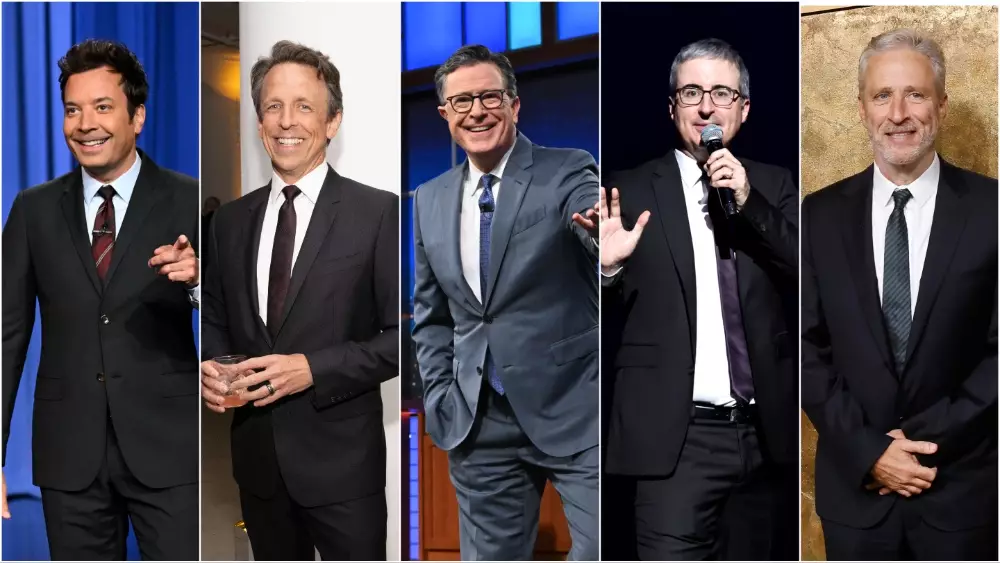The recent upheaval in the world of late-night television serves as a startling reminder of the fragile hold these shows have on culture and entertainment economics. When news broke about the potential cancellation of *The Late Show with Stephen Colbert*, it wasn’t just a blow to one personality— it was a seismic event that questioned the very sustainability of the traditional late-night format. Behind the scenes, this controversy exposes the shifting sands of media power, corporate influence, and the appetite – or lack thereof – for genuine commentary in a landscape increasingly driven by profit margins and artificial intelligence.
This sudden threat prompts viewers and critics alike to ponder: How beholden are these shows to the conglomerates that own them? Is this a sign that the golden era of late-night whimsy and political punditry is nearing its end? While many would argue that the genre’s decline has been gradual, recent events suggest a rapid acceleration driven by not just economic decisions but strategic moves to control narratives and suppress content deemed inconvenient.
The presence of celebrities such as Jimmy Fallon, Seth Meyers, John Oliver, Jon Stewart, and Andy Cohen on Colbert’s show in a show of solidarity underscores a deeper, unspoken alliance against corporate forces wielding the axe. The staged performances with pop culture references and satirical antics act as a symbolic defiance— a reminder that entertainment, at its core, is rebellion. Yet, beneath this defiance lies a hard truth: in an era dominated by algorithm-driven content and AI-powered decision-making, the human element is increasingly rendered subordinate. The “official” letter citing “financial reasons” feels like a bureaucratic euphemism for a deeper shift towards automation and data-driven content curation.
The Industry’s Illusion of Power and the Rise of Artificial Control
The letter signed by “the Paramount family of global entertainment properties and A.I. weapons systems” evokes unease— it’s a stark illustration of how corporate entities view entertainment not as art but as a calculable asset. The combined reference to “global entertainment properties” and “AI weapons systems” suggests a future where decisions are not made by executives’ intuition or audience engagement but by algorithms optimized solely for profit maximization. Such a shift diminishes the influence of creative voices, turning the industry into a faceless, emotionally detached enterprise.
This mechanization of decision-making raises profound questions about influence and agency. If AI systems determine what remains on air, can late-night hosts retain their authenticity? Or will they become puppets at the mercy of statistical models that favor a sanitized, mainstream narrative? The underlying fear is that the cultural power traditionally wielded by comedians and talk show hosts— their ability to comment on political and social issues— is gradually eroding under the corporate and technological juggernauts.
The celebrity solidarity on Colbert’s show feels like a last gasp— a rallying cry for the importance of human voices amid a landscape overrun by digital controllers. The performative jokes, the satirical antics, and even the references to political figures like Donald Trump, all serve as acts of resistance. They remind us that comedy and satire aren’t just entertainment but essential tools for critical engagement. When these platforms are threatened by economic and technological reconfigurations, the cultural fabric begins to fray.
Implications for Culture and Democracy
The suppression of Colbert’s show, whether temporary or permanent, symbolizes more than a business decision— it embodies a struggle over cultural influence and political agency. Late-night shows have historically played a pivotal role in shaping public discourse, providing satire that holds power to account and reflecting societal tensions. When such shows face termination over “financial reasons,” it signals a troubling trend: entertainment becomes disposable, and meaningful political commentary is marginalized in favor of profit-centric content.
Moreover, the show’s block-party style, featuring notable stars rallying around Colbert in a symbolic act of defiance, hints at a broader cultural resilience. The collective gesture underscores that entertainment is not merely a product but a platform for community, dissent, and truth-telling. Yet, as corporations and AI systems tighten their grip, the space for independent and satirical voices risks shrinking to a shadow of its former self.
This scenario highlights an urgent need to rethink how media power is exercised. It questions whether entertainment can remain a force for social critique or if it’s destined to become a mere echo chamber regulated by algorithms and corporate interests. If late-night television is to survive as a genuine forum for free expression, there must be a reckoning with the influence of profit-driven motives and the creeping dominance of artificial intelligence in content decisions.
In essence, the threat to Colbert’s show is more than about entertainment; it’s about safeguarding the integrity of cultural critique and democratic debate in a rapidly transforming media environment. As viewers, activists, and industry insiders grapple with these changes, one thing is clear: the future of late-night television depends on whether we value genuine voices over corporate convenience and machine-driven metrics.

